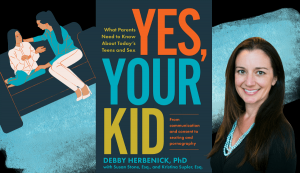Reprinted with permission from Online Sexuality Scholars blog
Why did you decide to write this book?
First – as a parent myself, I know how often kids surprise us with questions about bodies, relationships, and sexuality. Also, things come up in our kids’ lives – maybe in their friend group or at school– and sometimes we find ourselves addressing topics years before we ever thought we would. I wanted to write a book that helped parents navigate these conversations with more comfort and confidence.
Second – from both my own research on the mainstreaming of rough sex among young people and from talking with Kristina and Susan about what they see in their legal cases – it’s clear that sex has changed substantially over the past decade and we need to talk about it. In my team’s research, we’ve found that most college students report engaging in sexual choking (which is actually a form of strangulation) and that, even though it is usually described as consensual and often as pleasure, it also poses a number of health risks to young people, including to their brain health. As parents, we need to be informed so we can support our kids.
What’s behind the title – “Yes Your Kid”?
The title “Yes Your Kid” reflects an experience that so many sexuality educators have had, which involves sharing information with parents of teenagers about what sex is like today and being met with not quite disbelief, but some sense that their own child would never engage in those behaviors. Whether it’s sending a nude image (“sexting”), pressuring a peer for a nude image, watching pornography, or exploring rough sex, too many parents think their child would never do something like that. The title “Yes Your Kid” is meant to invite parents to step into the conversation, to accept that – whether or not they think their own child is doing a particular thing – that their child will be helped by open, frank, fact-based conversations with their parents.
What kinds of topics does Yes Your Kid cover?
Yes Your Kid provides parents with numerous tools to have ongoing conversations with their kids about bodies and sexuality. There’s an entire chapter on how to become a more askable, approachable parent. Whether readers are gearing up for conversations about how babies are made, puberty, condoms, birth control, sex and technology, pornography, or various forms of sexual behavior that are common today, Yes Your Kid has something to offer.
How is Yes Your Kid different from other sex education books for parents?
Let me be clear: there are many terrific books for parents about how to talk with their kids about sex. That said, most were written in the “before times” – before the widespread access to online pornography, before the COVID pandemic when kids and teens began living even more of their lives online, before most kids had access to smartphones, and before rough sex (like choking, slapping, and smothering) became normalized among teenagers. In Yes Your Kid, I talk about how we can use popular media as teachable moments to learn from our kids what their worlds are like and share our perspectives too. For parents who want to talk with their teens about the normalization of rough sex, consider this: the song “Lovin’ On Me” by Jack Harlow – which not only mentions choking, but describes it as “vanilla” – recently reached #1 on Billboard, has been a viral hit on TikTok, and its YouTube video has been viewed more than 60 million times in just two months since the song’s release.
Parents need updated information to talk with their kids about the realities of sex today. Throughout Yes Your Kid, readers will also find examples from Kristina and Susan’s legal cases, which provide real-world insights into the kinds of things that can and do go wrong – whether among middle school students, high school students, or college students – and what parents and their kids can learn from these situations.
There’s also a chapter on sexuality education for those with autism spectrum disorder, right?
Yes, we decided to include an entire chapter dedicated to sexuality topics for autistic teens and young adults, especially given how often I get questions from parents of autistic teenagers and young adults on this topic. As background, for many years I worked with children on the autism spectrum and their families. Also, as a college professor, I regularly have autistic students who have taught me a great deal about what more inclusive sexuality education can and should look like for them. Readers will find information about how to approach topics like puberty, reproduction, sexual and gender diversity, sensory needs, and much more in this chapter.
Anything else you want to add?
Yes, that talking about sex (and even some of the more complicated topics like sexting and pornography) may be awkward at first, but it’s also completely doable. Learning to talk openly about sensitive topics is a gift – especially when these conversations can be critical to our children’s safety and to their ability to develop healthy, connecting intimate relationships as they grow older.
Dr. Debby Herbenick – a sexuality researcher, educator, and Provost Professor at the Indiana University School of Public Health – has a new book out titled Yes Your Kid: What Parents Need to Know About Today’s Teens and Sex. The book includes contributions from Kristina Supler and Susan Stone, attorneys who have led numerous sexual misconduct and sexual assault cases throughout the United States, including at many college campuses. Follow Dr. Herbenick on Twitter or Instagram @DebbyHerbenick


Comments